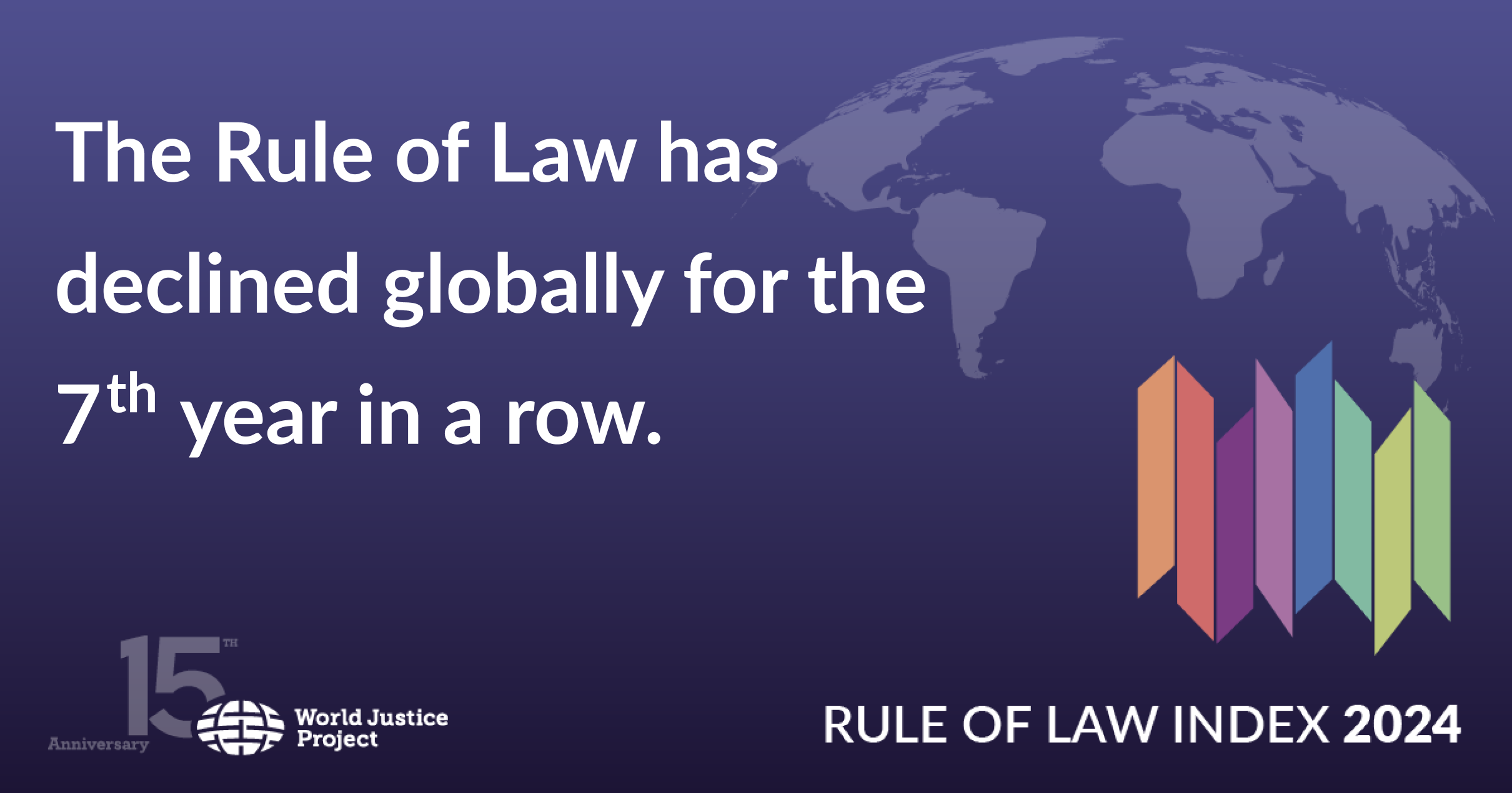

MEDIA CONTACT: [email protected]
The Global Rule of Law Recession Continues, But Some Progress Emerges
Authoritarian trends expand, improvements made on criminal justice and corruption measures
WASHINGTON (Oct. 23, 2024) – For the seventh year in a row, the rule of law has declined globally, according to the World Justice Project (WJP) Rule of Law Index 2024, released today.
This year, the rule of law again weakened in a majority of countries surveyed (57%). However, Index data also suggests the global rule of law recession is slowing and that progress is possible.
The proportion of countries where the rule of law is eroding has shrunk for the third year in a row, and some notable areas of improvement have emerged. For the first time in five years, more countries improved than declined on the Index factor measuring Absence of Corruption. This year, corruption declined in nearly three-fifths (59%) of countries.
A majority of countries also improved on ensuring effective criminal justice. Overall, civil justice declines have slowed considerably since the height of the global pandemic, though problems delivering timely and independent civil justice have continued to spread.
Meanwhile, authoritarian trends have continued to set countries back on protecting human rights and democracy.
“After seven consecutive years of rule of law declines it can be easy to focus on the negative. But to do so would ignore accomplishments in anti-corruption and the hard work occurring to improve justice systems globally,” WJP Co-founder and President William H. Neukom said. “The global community must redouble efforts to expand these rule of law gains in all areas.”
Troubling authoritarian trends continue
Last year, there was some hope that global authoritarian trends had begun to slow. This year’s Index, however, finds broader and deeper declines in two critical Index factors: Fundamental Rights and Constraints on Government Powers.
The long-term implications are troubling. Between 2016 and 2024, people in 81% of countries have lost protections for their fundamental rights. Additionally, 77% of countries show a weakening in governmental checks and balances, including oversight by legislatures, courts, civil society, and the media.
Over 6 billion people now live in countries where rule of law is weaker than it was in 2016.
“In every corner of the world, we continue to see leaders consolidating their authority,” Neukom added. “This has grave implications for individual freedoms, government accountability, and people’s ability to choose their leaders through free and fair elections.”
Elections in 2024
Since the global rule of law recession began in 2016, the Index subfactor measuring lawful transition of power has declined in 72% of countries. In this global year of the election, this principle is being put to the test.
In 2024 elections so far, the ruling party has maintained power in 13 out of 15 countries with below average scores on this subfactor.
Meanwhile, some of the most improved countries in the 2024 Index saw new, democratically elected governments take office last year. Voters in Brazil and Poland opted for change in each country’s most recent national elections. Both countries had experienced some of the largest rule of law declines since 2016 before changing course in the past year.
Rankings revealed
The WJP Rule of Law Index is the world’s leading source of original, independent rule of law data. Its rigorous methodology draws on expert and household surveys to measure rule of law in 142 countries and jurisdictions, covering 95% of the world’s population.
Each country’s score is an average of eight factors: Constraints on Government Powers, Absence of Corruption, Open Government, Fundamental Rights, Order and Security, Regulatory Enforcement, Civil Justice, and Criminal Justice.
The top-ranked country in the 2024 WJP Rule of Law Index is Denmark, followed by Norway (2), Finland (3), Sweden (4), and Germany (5). The top five ranked countries remain unchanged from 2023. The bottom ranked countries are Venezuela (142), Cambodia (141), Afghanistan (140), Haiti (139), and Myanmar (138).
The countries with the biggest rule of law declines in the past year are Myanmar, El Salvador, and Nicaragua, while the countries that improved their rule of law score most from 2023 to 2024 are Poland, Vietnam, and Sri Lanka.
Explore the full rankings and findings of the 2024 World Justice Project (WJP) Rule of Law Index at: http://www.worldjusticeproject.org/index/
###
- Access the complete 2024 Rule of Law Index and "Insights” booklet here.
- Find graphics (regional rankings, global rankings, and comparative maps) here.
- Find 142 country press releases organized by region here.
MEDIA CONTACT & INTERVIEW REQUESTS: [email protected]
About the WJP Rule Of Law Index:
The World Justice Project (WJP) Rule of Law Index® is the world’s leading source for original, independent data on the rule of law. Now covering 142 countries and jurisdictions, the Index relies on more than 214,000 household surveys and 3,500 legal practitioner and expert surveys to measure how the rule of law is experienced and perceived worldwide. Published annually since 2009 and subject to a rigorous methodology, the Index is used by governments, multilateral organizations, businesses, academia, media, and civil society organizations around the world to assess and address gaps in the rule of law.
About the World Justice Project:
The World Justice Project (WJP) is an independent, nonpartisan, multidisciplinary organization working to create knowledge, build awareness, and stimulate action to advance the rule of law worldwide.
Effective rule of law reduces corruption, combats poverty and disease, and protects people from injustices large and small. It underpins development, accountable government, and respect for fundamental rights, and it is the foundation for communities of justice, health, opportunity, and peace.
The World Justice Project defines the rule of law as a durable system of laws, institutions, norms, and community commitment that delivers: accountability, just laws, open government, and accessible justice. Learn more about these four universal principles and our work at: www.worldjusticeproject.org.






